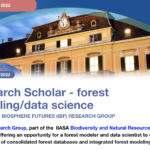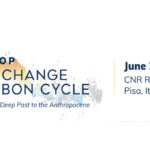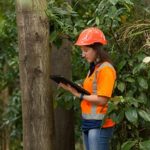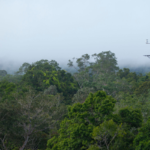PhD Position – Climate and the carbon cycle: identifying responses and impacts using satellite remote sensing and machine learning
Summary
You will develop approaches to describe the direct and lagged effects of climate on the terrestrial carbon cycle, informed by decades of remote sensing observations and state of the art machine learning methods.
Project background
Large-scale climate variations, e.g. El Nino, can have immediate effects on the terrestrial carbon cycle via anomalous periods of drought, fire, and storm damage to forests. These immediate effects have longer-term implications for plant functioning and mortality rates, which subsequently have implications for net primary production and carbon storage that are often more difficult to observe without in situ measurements.
Space-borne instruments now observe a wide range of land surface and vegetation properties and associated atmospheric variables that can help us to understand the lagged effects of climate on terrestrial vegetation. The challenge lies in developing an infrastructure that can integrate the corresponding volume of heterogeneous data.
In this project, you will use machine learning to explore relationships between environmental variables that are measured from satellite instruments (e.g., phenology, hydrology, evapotranspiration, photosynthetically active radiation, biomass burning, solar induced fluorescence and atmospheric CO2). These relationships will be interpreted within the context of current scientific knowledge and used to test and develop existing land surface models, e.g. the Joint UK Land Environment Simulator (JULES) community land surface model. The resulting model predictions will be evaluated using sparse but detailed decadal-scale measurements collected at plot sites around the world. The long history of El Nino events will be a particular focus, taking advantage of available ground-based ecological data and satellite measurements.
Research questions
We propose three ambitious and overarching research questions that could each be the focus of the PhD project, depending on the qualifications of the successful applicant:
- Which satellite remote sensing data provide the most robust lagged signal between climate variation and the terrestrial carbon cycle?
- What is the regional importance of direct and lagged effects of climate on the terrestrial carbon budget?
- Does ecological memory ameliorate the direct and lagged impacts of extreme events?
Methodology
We will use satellite data that are freely available from NASA and ESA repositories. Ground based data are available via collaborations with groups across the world, and access to FLUXNET data (https://fluxnet.ornl.gov/) will be via Professor Keenan. We will also take advantage of our links to these instruments via the NERC National Centre for Earth Observation (http://www.nceo.ac.uk).
For machine learning tools, we will take advantage as much as possible of Tensorflow (www.tensorflow.org), an efficient and freely-available software suite.
Based on existing collaborations we will likely use the JULES land surface model (Clark et al., 2011), which describes land surface process esin the UK Earth System Model.
Year 1: Research training. Familiarisation with satellite remote sensing data and machine learning. Begin to assess the predictive capabilities of a variety of machine learning approaches for different proxies of ecological function.
Year 2: Identify the approaches and proxies that are most suitable for quantifying responses to anomalous climate variability.
Year 3: Quantify the extent of lagged impacts of extreme events, and assess whether ecological memory plays a role in modulating responses.
Training
A comprehensive training programme will be provided comprising both specialist scientific training and generic transferable and professional skills.
Requirements
The successful candidate will have a degree in the physical sciences, most likely physics, chemistry, or applied mathematics. This is a computational project so some knowledge of coding would be useful (e.g., Python, R, Matlab).
References
- Clark, et al.: https://doi.org/10.5194/gmd-4-701-2011, 2011.
- Lary et al.: https://doi.org/10.1007/978-3-319-65633-5_8
- Xiao et al.: https://doi.org/10.1016/j.rse.2019.111383
Supervisors
| Paul Palmer | School of GeoSciences | Paul.Palmer@ed.ac.uk | www.palmergroup.org/ |
| Trevor Keenan | UC Berkeley, California, USA | trevorkeenan@berkeley.edu | www.keenangroup.info |
| Edward Mitchard | School of GeoSciences | edward.mitchard@ed.ac.uk | mitchardgroup.wordpress.com |
Info Autori
Istituto per i Sistemi Agricoli e Forestali del Mediterraneo (ISAFOM)
Consiglio Nazionale delle Ricerche (CNR)






















